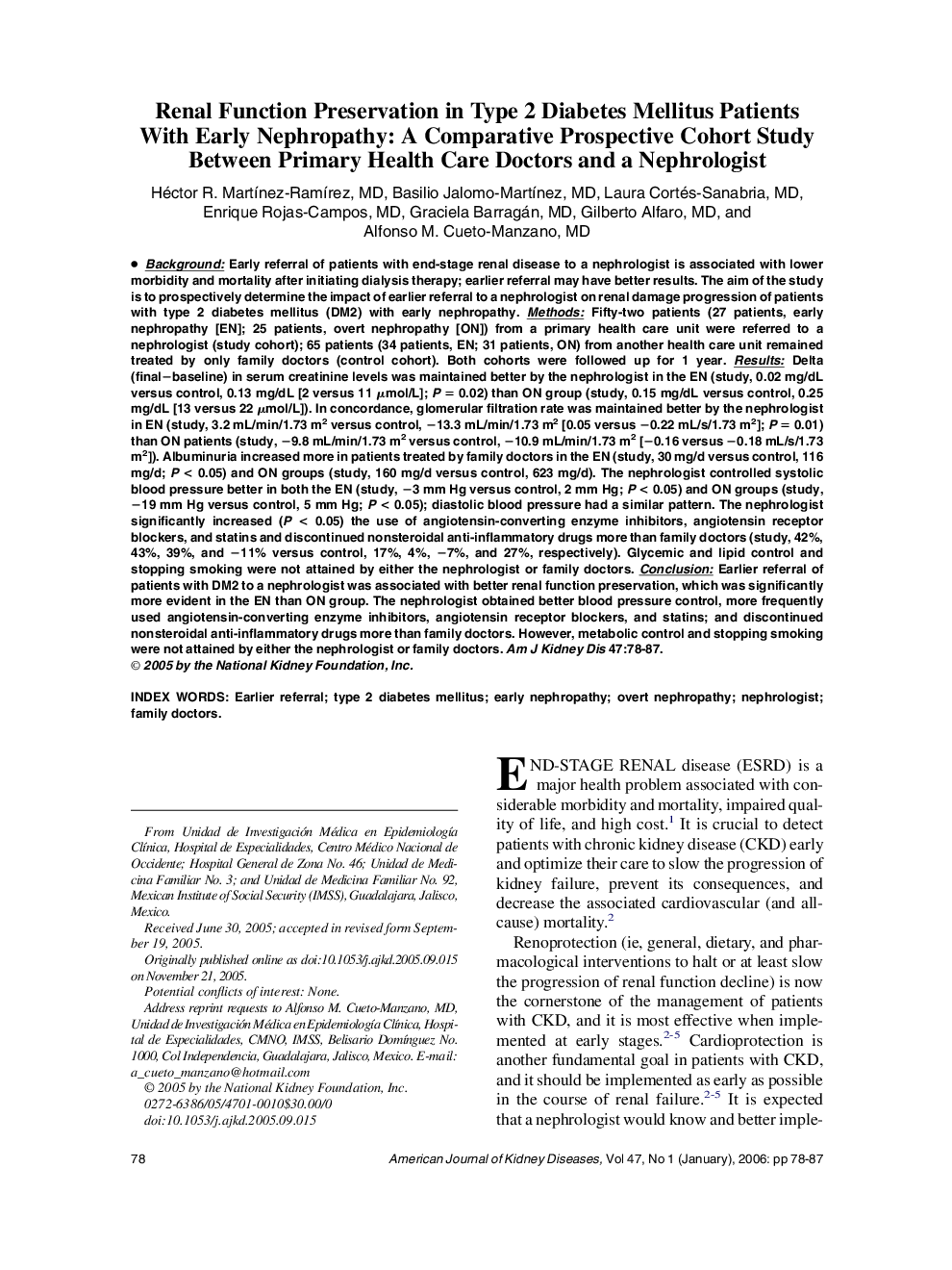| Article ID | Journal | Published Year | Pages | File Type |
|---|---|---|---|---|
| 3852458 | American Journal of Kidney Diseases | 2006 | 10 Pages |
Abstract
Background: Early referral of patients with end-stage renal disease to a nephrologist is associated with lower morbidity and mortality after initiating dialysis therapy; earlier referral may have better results. The aim of the study is to prospectively determine the impact of earlier referral to a nephrologist on renal damage progression of patients with type 2 diabetes mellitus (DM2) with early nephropathy. Methods: Fifty-two patients (27 patients, early nephropathy [EN]; 25 patients, overt nephropathy [ON]) from a primary health care unit were referred to a nephrologist (study cohort); 65 patients (34 patients, EN; 31 patients, ON) from another health care unit remained treated by only family doctors (control cohort). Both cohorts were followed up for 1 year. Results: Delta (finalâbaseline) in serum creatinine levels was maintained better by the nephrologist in the EN (study, 0.02 mg/dL versus control, 0.13 mg/dL [2 versus 11 μmol/L]; P = 0.02) than ON group (study, 0.15 mg/dL versus control, 0.25 mg/dL [13 versus 22 μmol/L]). In concordance, glomerular filtration rate was maintained better by the nephrologist in EN (study, 3.2 mL/min/1.73 m2 versus control, â13.3 mL/min/1.73 m2 [0.05 versus â0.22 mL/s/1.73 m2]; P = 0.01) than ON patients (study, â9.8 mL/min/1.73 m2 versus control, â10.9 mL/min/1.73 m2 [â0.16 versus â0.18 mL/s/1.73 m2]). Albuminuria increased more in patients treated by family doctors in the EN (study, 30 mg/d versus control, 116 mg/d; P < 0.05) and ON groups (study, 160 mg/d versus control, 623 mg/d). The nephrologist controlled systolic blood pressure better in both the EN (study, â3 mm Hg versus control, 2 mm Hg; P < 0.05) and ON groups (study, â19 mm Hg versus control, 5 mm Hg; P < 0.05); diastolic blood pressure had a similar pattern. The nephrologist significantly increased (P < 0.05) the use of angiotensin-converting enzyme inhibitors, angiotensin receptor blockers, and statins and discontinued nonsteroidal anti-inflammatory drugs more than family doctors (study, 42%, 43%, 39%, and â11% versus control, 17%, 4%, â7%, and 27%, respectively). Glycemic and lipid control and stopping smoking were not attained by either the nephrologist or family doctors. Conclusion: Earlier referral of patients with DM2 to a nephrologist was associated with better renal function preservation, which was significantly more evident in the EN than ON group. The nephrologist obtained better blood pressure control, more frequently used angiotensin-converting enzyme inhibitors, angiotensin receptor blockers, and statins; and discontinued nonsteroidal anti-inflammatory drugs more than family doctors. However, metabolic control and stopping smoking were not attained by either the nephrologist or family doctors.
Related Topics
Health Sciences
Medicine and Dentistry
Nephrology
Authors
Héctor R. MD, Basilio MD, Laura MD, Enrique MD, Graciela MD, Gilberto MD, Alfonso M. MD,
